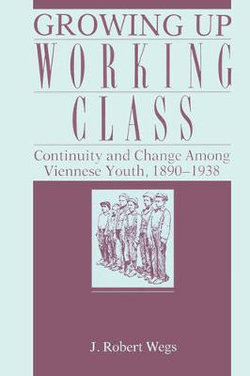This study of working-class culture, youth behavior, and the response of youths to conditions in a European setting acknowledges that poverty existed among much of the working class but questions the implicit arguments that these conditions necessarily brought about destructive responses. Until recently, various simplistic paradigms have dominated studies of European workers. These have stressed the misery of urban laborers in a capitalistic society, the functional importance of the isolated nuclear family in an industrial society, or the violent, authoritarian, and intolerant nature of working-class society as a result of cultural deprivation. The approach here, in contrast, is allied with the current trend in social history to allow for elements of diversity and individual initiative within the labor population. Numerous oral interviews are used to enrich other data and to provide evidence on family life that is missing in traditional sources.
In examining the way life was actually lived, this book deals primarily with the children of manual laborers, but includes the children of other socially disadvantaged groups in the working-class districts. It analyses the social dimensions among laborers and those immediately above them, such as small-scale shopkeepers. With the view that there is not just one working-class culture but many, it explains the diversity of the working-class experience rather than concentrating only on the most impoverished stratum within it. Wegs argues that much of the working class had a fuller and richer life than is depicted in existing literature. The length of the period covered makes it possible also to draw comparisons and identify long-term trends. Separate chapters are devoted to topics such as everyday life, schooling, work, and sex and marriage.
By showing how working-class youth were isolated within primarily working-class areas but still tied to the dominant culture through the schools, social workers, and the Social Democratic subculture, the book adds an important dimension to the study of the working class. It provides a fuller dimension to the study of the working-class youth by dealing with young women as well as men, and with major arguments concerning sexual divisions at work, in the family, and in society. It examines the subordinate position of women in working-class culture but also notes their significant role in the family and in society.
Wegs's study will be of interest to students of European history and social history, particularly those interested in the working class, issues of adolescence, and the family.
- ISBN:
- 9780271028071
- 9780271028071
-
Category:
- Age groups: adolescents
- Format:
- Paperback
- Publication Date:
-
15-11-1988
- Language:
- English
- Publisher:
- Pennsylvania State University Press
- Country of origin:
- United States
- Pages:
- 216
- Dimensions (mm):
- 234x156x15mm
- Weight:
- 0.34kg
This title is in stock with our Australian supplier and should arrive at our Sydney warehouse within 1 - 2 weeks of you placing an order.
Once received into our warehouse we will despatch it to you with a Shipping Notification which includes online tracking.
Please check the estimated delivery times below for your region, for after your order is despatched from our warehouse:
ACT Metro: 2 working days
NSW Metro: 2 working days
NSW Rural: 2-3 working days
NSW Remote: 2-5 working days
NT Metro: 3-6 working days
NT Remote: 4-10 working days
QLD Metro: 2-4 working days
QLD Rural: 2-5 working days
QLD Remote: 2-7 working days
SA Metro: 2-5 working days
SA Rural: 3-6 working days
SA Remote: 3-7 working days
TAS Metro: 3-6 working days
TAS Rural: 3-6 working days
VIC Metro: 2-3 working days
VIC Rural: 2-4 working days
VIC Remote: 2-5 working days
WA Metro: 3-6 working days
WA Rural: 4-8 working days
WA Remote: 4-12 working days




Share This Book: